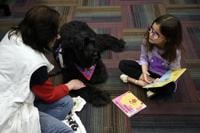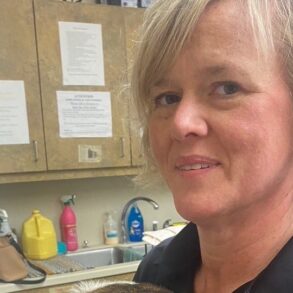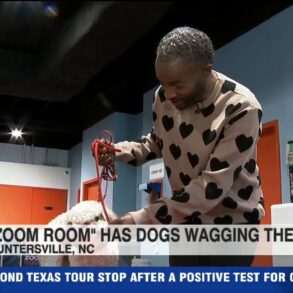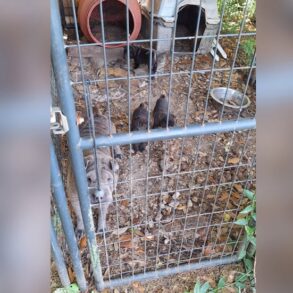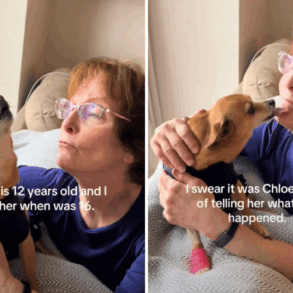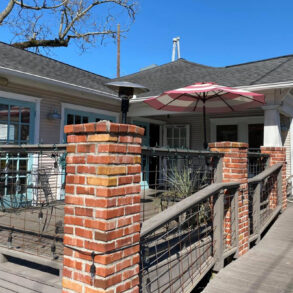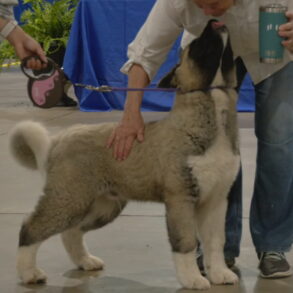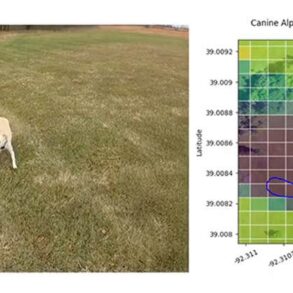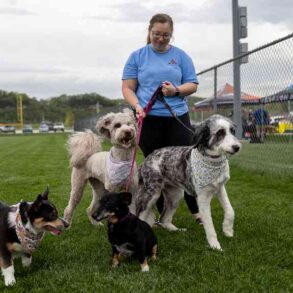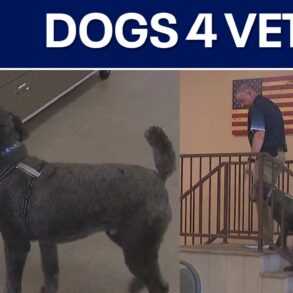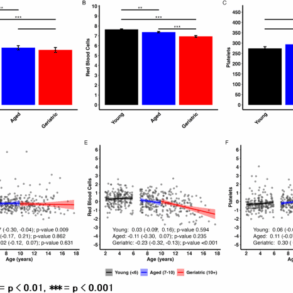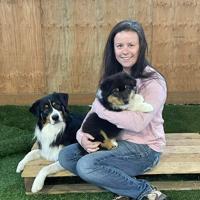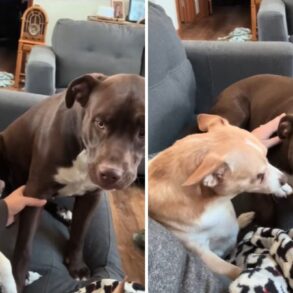Four wolfdogs jumped a six-foot-high backyard fence in McMinnville on March 7 and roamed more than a mile, killing a pet dog and two cats before they were caught.
The wolfdogs’ killing spree shocked McMinnville but it didn’t necessarily surprise them. It was the culmination of a years-long standoff between city officials and Sandra Atwood, a 41-year-old resident who got her first wolf-dog hybrid mix in 2021 and, in the years since, acquired four more.
Although it’s unclear which of Atwood’s dogs killed the pets, all four are currently impounded, and Atwood faces 22 citations in McMinnville Municipal Court. She might never see her dogs again — an outcome that neighbors, by all accounts, would be pleased with, after years of complaints about the dogs’ noise, smell and ability to escape.
Some residents blame city inaction — and say the city’s dog-control municipal codes are too weak, particularly because the city doesn’t have an animal-control department.
Atwood has insisted that she made good-faith efforts to meet the city’s demands, and that the city’s confused, contradictory code enforcement pushed her into actions that ultimately allowed the wolfdogs to escape, endangering the public and killing the three pets in the neighborhood.
The city, for its part, refuses to accept blame, saying in an email response to questions that it has tried to tackle the dangers associated with wolfdogs through various mechanisms in city law, but that Atwood “has skirted the codes and failed to adequately contain her animals despite [the city’s] efforts.”
Atwood has said that at least three of her dogs’ DNA test results showed they are between 32% and 63% “Greywolf,” records show. There is no statewide law banning wolf-dog hybrids, although the Oregon Department of Fish and Wildlife says owning them as pets is “discouraged because of the potential threat to human safety.”
Since her dogs’ deadly rampage, Atwood has vacillated between accepting responsibility for her dogs killing people’s pets and casting the resulting community uproar as “hysteria” and a “witchhunt.”
“I regret very much what happened,” she wrote in a text message to The Oregonian/OregonLive. “I know it’s my fault and I need to be punished for what my dogs did. I don’t know what got into them. I can’t explain it, or excuse it.”
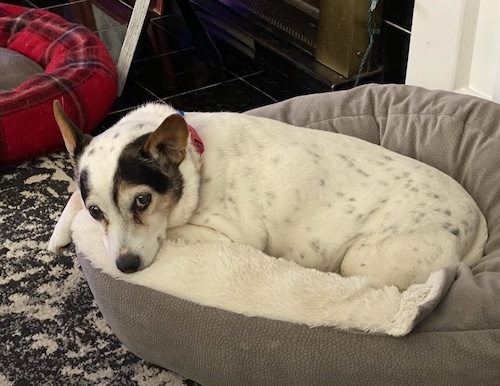
Roxy, the Jack Russell terrier killed by wolfdogs in McMinnville March 7, 2025.Courtesy of Jonathan Jacoby
Jonathan Jacoby is among those who would like to see consequences for Atwood. On March 7, he let his mother’s Jack Russell terrier, Roxy, out into the property’s front yard at around 7:30 p.m. and, minutes later, after hearing noises, rushed outside to find two wolfdogs standing over the terrier’s mauled, dead body.
“This is far from the first time these [wolfdogs] have been loose in our community,” Jacoby wrote in a letter to the McMinnville City Council two days after the attack. “This incident has raised serious concerns over the city’s ability to enforce and the priority given to animal incidents.”
David Ligtenberg, McMinnville’s city attorney, said he’s not aware of any city efforts prior to the March 7 attacks to seize Atwood’s dogs, adding that earlier code violations by Atwood likely wouldn’t have been considered serious enough to warrant it.
Atwood said she loves her wolfdogs because they match her temperament and she finds them fascinating.
“They’re just much closer to nature and closer to that kind of instinctual, kind of raw or more radical essence of a dog,” she told The Oregonian/OregonLive. “It’s some of the coolest stuff I’ve ever seen.”
Atwood’s love for the animals is exemplified in the rapid growth of her wolfdog pack, which has expanded to at least five in four years.
Records indicate that there’s been trouble with Atwood’s dogs since at least December 2022, when two of her dogs escaped the property and attacked a neighbor’s dog. In subsequent years there were multiple reports of her dogs getting loose again, along with complaints about noise and smell.
On September 15, 2024, the dogs triggered a police response when four people called authorities to say there were large dogs roaming the streets, including one caller who said the dogs appeared to be attacking other dogs.
“I told Sandra she needed to be more proactive about capturing the dogs as we had numerous people complaining about them,” the officer wrote in a report. “After waiting for over 30 minutes the dogs were still at large.”
The McMinnville officer cited Atwood for letting her dogs run loose.
The following month, the city began a code enforcement battle that Atwood claims caused the tragic March 7 attacks.
On Oct. 10, the city cited Atwood for having an animal enclosure in her backyard — a violation of city code. Atwood appealed the citation and, in January, met with code enforcement officials and an independent, third-party attorney for a hearing to determine whether the fences that she had put up around her backyard constituted an animal enclosure.
Atwood had installed “lean-ins” — two-foot-long angled metal extensions at the top of the fence — to prevent her wolfdogs from getting out. The attorney concluded that the lean-ins turned the fence into an enclosure and, on Feb. 6, the city ordered Atwood to remove them within 30 days.
When Atwood got that order from Ligtenberg on March 3, just a few days before the deadline, she was perplexed and angry, believing she had done the right thing to protect her neighbors from the dogs by installing the lean-ins.
And she was upset that the city had been so late in telling her that she had lost her appeal, meaning she had mere days to decide whether to appeal further or to simply comply with the order.
Wanting to avoid being fined $250 per day for continuing to violate city code, she said she started to remove the lean-in fencing three days later, on March 6. Her plan, she said, was to keep the dogs tethered or out of the backyard unless she was there watching over them.
But she didn’t stick to the plan the following day, when she was playing with the dogs in the backyard and heard an Amazon delivery arrive. She left the backyard to get the delivery and, by the time she returned a minute later, four of her dogs had jumped the fence, she said.
Atwood admits now that she “should not have taken the lean-in down.” But she also blames the city for ordering her to do so despite knowing her wolfdogs could easily get out.
The city, however, accepts no blame for the dogs jumping the remaining fence and racing off to kill neighborhood pets and scare residents. Its attitude appears to be that the backyard enclosure wasn’t legal, full stop. How Atwood would keep her dogs from escaping without it was her responsibility, not the city’s.
“Ms. Atwood’s decision to remove the fence-tops prior to ensuring that her animals were otherwise contained was grossly negligent,” Ligtenberg, the city’s attorney, said in an email to The Oregonian/OregonLive.
Ligtenberg said there had been an internal miscommunication that led to Atwood getting the notice late and that the city would not have held her to the 30-day deadline to remove the lean-ins.
Asked how Atwood could have known she actually had more than five days to comply, Ligtenberg again put the onus on her.
“She should have asked,” Ligtenberg said.
Two of Atwood’s wolfdogs — Pearl and Totem — stayed relatively close by her house after the animals escaped, she said, and she was able to get them back relatively quickly. Two others, Darko and Chaote — the ones that attacked Jacoby’s dog, Roxy — wandered much farther, tracing a path covering more than a mile before they were caught, records show.
Multiple McMinnville residents were left traumatized.
There was Jacoby, who chased the wolfdogs until they dropped Roxy’s dead body in the middle of the street. There was the woman who was getting ready to feed her cat when the wolfdogs ran over and snatched it, killing it, according to a police report. And there was another resident who said he let his cat out of the house and, soon after, saw three of Atwood’s dogs in his front yard. Later that night he found his cat dead.
Atwood took the dogs back in that day.
McMinnville residents’ outrage burst out almost immediately after the deadly attacks.
On March 9, emails began pouring in to McMinnville city officials, including one from Jacoby, expressing horror over the attacks and demanding action. Testimony at a City Council meeting two days later was even more emotional.
The city leapt into action. Six days after the attacks, the city had a warrant to seize Atwood’s dogs, and it did so. (Ligtenberg said the city doesn’t have its own kennel and that, on March 7, the private kennel it contracts with did not have space.)
Many residents now want to make sure nothing like this can happen again.
Jacoby would like city code to make clear that certain animals require the kind of infrastructure that isn’t currently legal to have within the city. Others are calling for the city to stand up its own animal-control department. Yamhill County retired its countywide dog-control program in 2017.
Ligtenberg said the city can’t afford an animal-control facility and that it is considering “only minor amendments” to the portion of city law pertaining to dog ownership.
Atwood is now getting ready for her April 30 hearing in McMinnville Municipal Court. In anticipation of that hearing, she and her son have constructed a fortified, concrete-and-metal enclosure in her yard where she could keep the wolfdogs when she’s not watching them, she said, hoping that could help convince the judge to let her keep the dogs.
Under city code, the judge could order the dogs destroyed, Ligtenberg said.
Jacoby said he’ll be at the court hearing, too, “in support of Roxy, my family and our community members who also suffered losses.”
— Fedor Zarkhin is a breaking news and enterprise reporter. Do you have a story? Reach him by phone or text at 971-373-2905 or by email at fzarkhin@oregonian.com.
Our journalism needs your support. Subscribe today to OregonLive.com
This post was originally published on this site be sure to check out more of their content.




